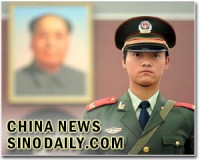 |
Washington (UPI) Mar 2, 2009 Despite the ire of China, the United States has agreed to press ahead with a controversial $6.4 billion sale of U.S. missiles, helicopters and ships to Taiwan. The proposal was cleared by the U.S. Congress following a 30-day window for objections, which passed without official comment. The arms deal includes Black Hawk helicopters, mine hunter ships and advanced Patriot missiles, built by Lockheed Martin and Raytheon. U.S. officials have long indicated that the deal would be followed by plans to gauge the design and construction of diesel-powered submarines for the island, which China deems a wayward province. China is believed to have more than 1,000 missiles pointed at the island although relations with Taiwan have eased in recent years. That thaw was supposed to limit U.S. military cooperation with Taiwan, Chinese officials said. But the U.S. arms deal has China fuming. Relations between China and the United States have also seen a relative thaw in recent years but disputes over trade, Internet censorship and climate change have stoked tensions in bilateral ties. Concerned about the knock-on effects that the arms decision could have, Washington dispatched two senior officials to Beijing this week, hoping to allay concerns and iron out differences. China, though, remains adamant, opposing the Taiwan arms sale as a move that could seriously undermine relations with the United States. It has instead urged Washington to consider the consequences of such a defense deal, threatening the suspension of military contacts with the United States as well as slapping sanctions on the companies manufacturing the weapons bound for Taiwan. In addition to Lockheed Martin and Raytheon, the companies taking part in the $6.4 billion deal include United Technologies Corporation, maker of the Black Hawk helicopter, and Boeing, manufacturer of the Harpoon missiles. Washington is required under the Taiwan Relations Act to ensure that Taiwan can defend itself. The United States remains the island's top arms supplier. China and Taiwan split at the end of a civil war in 1949 and, during a his visit to China last November, U.S. President Barack Obama reiterated Washington's longstanding position that there was "only one China." While concerned about the implications, politicians and political pundits insist that Washington's decision to bolster Taiwan's military might will not derail U.S.-Sino relations. "No matter what happens with ... (the) Taiwan arms sales, with the conflicts on climate change, with the Iran nuclear problems," Yan Xuetong, director of the Institute of International studies at Tsinghua University in Beijing told Bloomberg News, "there might be a lot of troubles and ups and downs between China and the United States but people know that there is a limit."
Share This Article With Planet Earth
Related Links Taiwan News at SinoDaily.com
 Taiwan to challenge China's 'soft power'
Taiwan to challenge China's 'soft power'Taipei (AFP) Feb 17, 2010 Taipei plans to establish a string of "Taiwan Academies" around the world in a race with Beijing to promote traditional Chinese language and culture, an official said Wednesday. President Ma Ying-jeou has told the Cabinet-level Council for Cultural Affairs to work out a plan for the academies, his spokesman said, in what could become a new competition about the spread of "soft power" abroad. ... read more |
|
| The content herein, unless otherwise known to be public domain, are Copyright 1995-2010 - SpaceDaily. AFP and UPI Wire Stories are copyright Agence France-Presse and United Press International. ESA Portal Reports are copyright European Space Agency. All NASA sourced material is public domain. Additional copyrights may apply in whole or part to other bona fide parties. Advertising does not imply endorsement,agreement or approval of any opinions, statements or information provided by SpaceDaily on any Web page published or hosted by SpaceDaily. Privacy Statement |